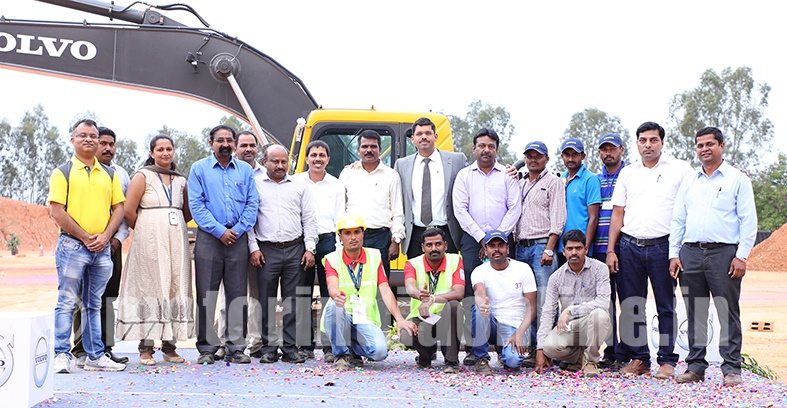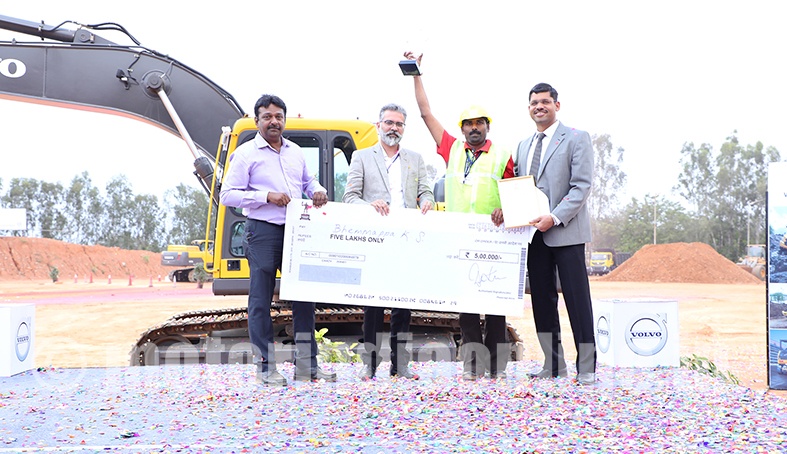A stunned Bheemappa froze in his seat for a few seconds and then broke into a wide beaming smile and almost ran to the podium as the emcee repeated his name. And why not, he was declared the Volvo CE Operator Champion and was handed over a cheque for five lakh rupees by the officials of Volvo Construction Equipment (Volvo CE), National Skill Development Council (NSDC) and Infrastructure Equipment Skill Council (IESC) for his superlative performance in the various rounds of the competition. The first runner up, Narendra Singh, hailing from Rajasthan received two lakh rupees.

Belonging to Bellary district of Karnataka, K S Bheemappa was one of the many competitors who have now realized the value of upgrading one’s skills – the aim behind the coming together of the three organizations under Pradhan Mantri Kaushal Vikas Yojana (PMKVY).
He shared, “I hope to inspire others like me. Both education and skills are necessary to become successful in life. This certificate will help me find better work and go up the ladder.”
The championship
Volvo CE, NSDC and IESC are the brains behind organizing this 18-month-old championship, started in October 2015, held in nine regions across India with around 500 contenders competing for the coveted title.
Vice President and Head of Volvo CE, Mr. Dimitrov Krishnan, said: “Skill India initiative of the central government echoes our purpose of bridging the skill gap in India. Construction industry, especially, operates with expensive equipment and huge investments. Our equipments are incomplete without a skilled operator. Our endeavor is that the operator understands the technology, product limitations, and site conditions and also knows how to use the product to its optimum capacity… which will make a huge difference to profitability in the construction industry.”
The sole purpose behind initiating the Operator Champion challenge was the ‘need to celebrate, recognize and increase the value of the operator in the construction equipment industry’. Mr. Krishnan further explained that: “We wish for them to learn the value of their skills and themselves. This is about changing perception about themselves in their minds.”

Man & Machine
The Operator Champion competition, which has seen about 60 participants on an average at each of the nine regional rounds, included training on the first day, learning skills using the product, followed by a series of tests that included written and obstacle tests, with a fuel test as a wrap up.
Talking about the equipment used in the competition, Mr. Krishnan explained: “Only one equipment, a 20-ton hydraulic excavator, consuming 14-16 litres of diesel per hour, was used mostly. For future competitions, we may have wheel loaders, compactors, pavers, and motor graders also.”
The participants competed in a range of challenges including fastest tipper loading, prick the lemon – without going through to the ground, placing wooden box inside a tyre, picking the boulder and a couple of rounds on the simulator.
CE Sector in India
In India, the accepted thumb rule is – for every 12-15 construction equipment one mechanic is needed and for each machine, two operators. With the sale of construction equipment showing growth this year by 35 per cent, officials hope that there will be a considerable increase in the demand for skilled operators in the near future. Currently, the demand is being met by existing pool of operators who, probably, have more experience than formal learning.
Mr. H.S. Mohan, CEO – Infrastructure Equipment Skill Council, threw light on how demand is sprouting slowly yet steadily, “National Highways & Infrastructure Development Corporation Ltd., for example, is busy in the North-East. They are now mandating that the equipment handlers, operators and mechanics should be IESC certified.”
NHIDCL, a fully owned company by MORTH, is but one organization that is creating an avenue for skilled and certified operators that undergo training under Skills Initiative. There will be many more such avenues, hopefully.
Creating demand
If the country requires ‘20 million operators by the year 2020’, then creating demand in a hitherto unorganized sector requires strategic planning and in-depth thought process, besides the need to make it lucrative for the vast number of unemployed youth in India.
Mr. Gaurav Kapoor, Head – Industry Partnership, CSR & SSC Engagement, NSDC, shared: “We are driving the demand in multiple ways. Besides the government mandate, we are bringing organized ways of working to highly unorganized sectors like equipment handling by certifying worker skills and once skilled population level reaches beyond 50 per cent, then we believe that a certified operator will be the choice, triggering the unskilled workers to opt for training. Then there are Sector Skill Councils which have been formed which are directly interacting with each industry, aggregating demand and then linking it back to training. Our own Infrastructure Equipment Sector Skill Council is just two years old but others pertaining to, say automobiles, are older and have created fabulous models.”
Another treasure trove that Mr. Mohan pointed to was the pool of retired army personnel who have the benefit of discipline, training and a positive attitude. According to him, they draw a high level of reliability and trust among the fleet owners, which makes it easier for them to be employed with a little ‘up-to-date’ training. He said: “Army personnel retire at a young age of 30-35 years. They too need an alternate profession to earn their living. We find them to have undergone excellent training of 64 weeks and that they are good operators and mechanics. So we offer them a bridge course of say a couple of days and then they are ready to get on the job.”
Mr. Krishnan felt: “Together we need to make ‘skilling the workers’ mandatory. It should come in as a regulation so that at a certain point in time, the value of this work will get monetized. For the last two years, IESC, NSDC, all the manufacturers, and ICEMA have created a framework. Now we are in the process of bringing on demand. Operator Champion is one of the marketing events that create demand for skill – what does skill mean for a construction user, or as the owner of equipment. This is to raise their expectations from themselves.”
He further added that Volvo CE has finished seven Recognition of Prior Learning programs under NSDC, which defines various job categories, certain skill level and people who have the past experience of handling equipment getting certified by examination. He said, “We have a tie up with a foundation to conduct ground-up training where students who are drop outs from school after eighth standard come into these centers and get trained for 90 days. After which they come to our center for their final one week training using simulators, and get assessed.”
Each competitor received a ‘participation certificate’ with an ID number, and QR code.
Mr. Kapoor shared: “The certificate carries a unique number which records any advanced skilling that the person undergoes in future. A mere scan furnishes the potential employer to know the person’s work history and skills.”
These certificates are valid in countries like the UK, Canada, Australia, and in the Middle East.
Operator Champion Bheemappa and the first runner-up, Narendra Singh became the true successful faces of Skill India initiative.